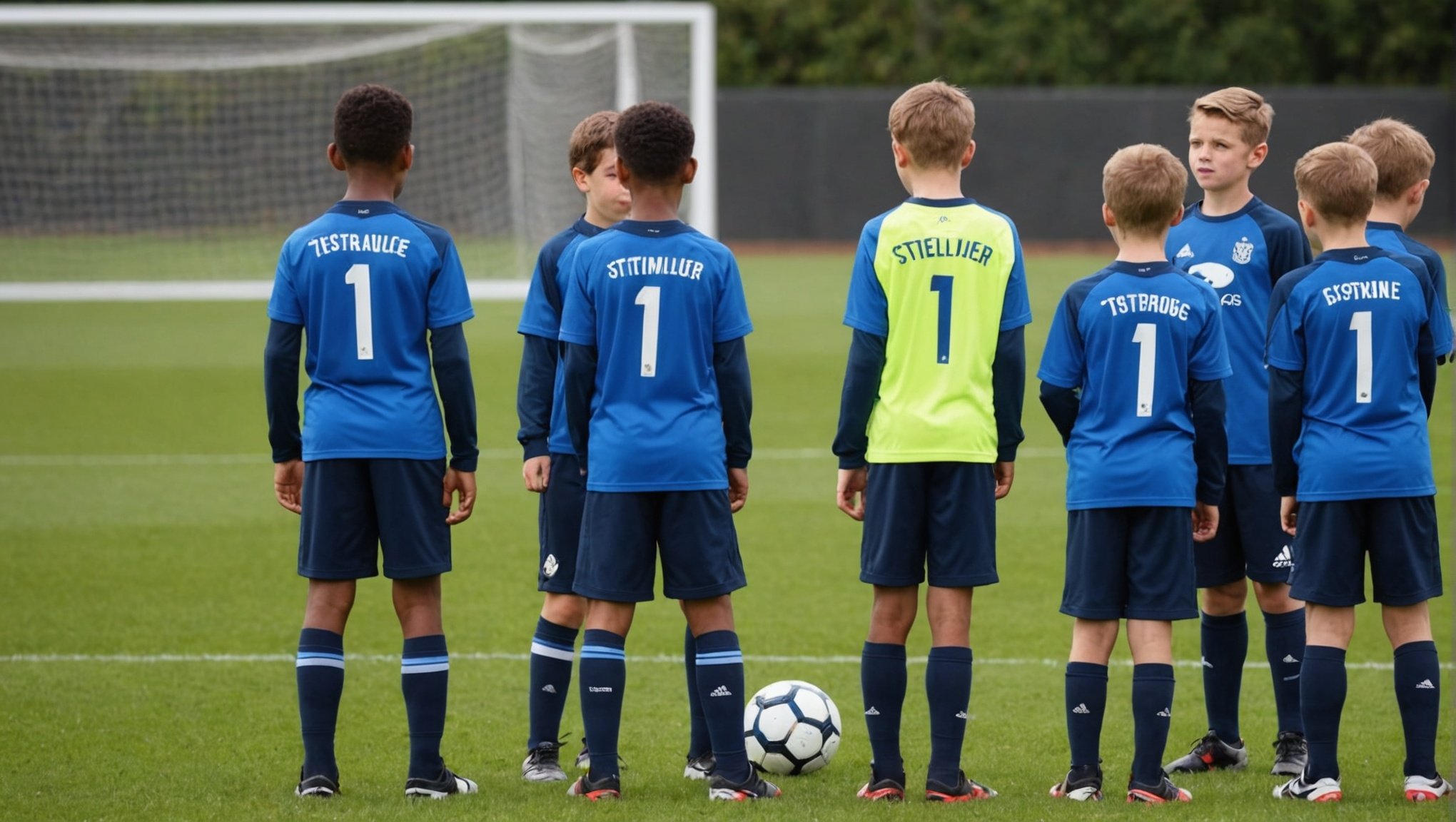Training young football players goes beyond technical skills. Cognitive development is essential for fostering smarter, more adaptable athletes. Innovative strategies like game-based learning, decision-making drills, and mental conditioning can elevate players' performance on and off the field. Embracing a holistic approach in football academies nurtures not only athletic prowess but also critical thinking and resilience. Discover how these methods can transform the future of young footballers and create a winning mindset.
Understanding Cognitive Skills in Football
Cognitive skills in football are essential abilities that players use to process information, make decisions, and execute actions on the field. These skills include perception, attention, memory, and decision-making. Cognitive development is critical for young players as it enhances their ability to anticipate opponents' moves and react swiftly.
In parallel : Enhancing Success: Strategies for UK Football Academies to Equip Young Talents for Professional Trials
Football training techniques often incorporate drills that improve these cognitive skills. For instance, exercises that require players to make quick decisions under pressure can enhance their on-field performance. This training helps players develop a keen sense of awareness and adaptability, crucial for navigating the fast-paced nature of the game.
Key cognitive skills relevant to young players include spatial awareness, which allows them to understand their position relative to others, and pattern recognition, which helps in predicting opponents' strategies. These skills impact performance by enabling players to make better tactical decisions, improving their overall gameplay.
Also to see : Unlocking Potential: Strategies for Football Coaches to Cultivate Leadership Skills in Young Athletes
By focusing on cognitive development through targeted football training techniques, young athletes can significantly enhance their performance, making them more effective and strategic players on the field.
Innovative Training Strategies for Cognitive Development
In the realm of football academies, cognitive training strategies have become increasingly innovative, focusing on enhancing player development. These methods are designed to sharpen the mental agility of young athletes, ensuring they are well-equipped to handle the complexities of the game.
Overview of Innovative Training Techniques
Football academies employ a variety of innovative methods to develop cognitive skills. Techniques such as small-sided games are popular, as they require players to make quick decisions in a dynamic environment, simulating real match conditions. These exercises are pivotal in honing players' decision-making and spatial awareness.
Examples of Drills and Exercises
Drills that focus on multitasking and reaction time are common. For instance, exercises that combine physical activity with mental challenges, like solving puzzles while dribbling, can significantly boost cognitive abilities. These activities encourage players to think on their feet and adapt to changing situations.
Integration of Technology
The integration of technology in cognitive training is another exciting development. Football academies now use apps and software to track and analyze players' cognitive performance. These tools provide valuable feedback, allowing coaches to tailor training programs to individual needs, further enhancing player development.
Age-Appropriate Techniques for Young Players
When it comes to youth development in football, it's crucial to adapt training methods to the age and developmental stage of young players. Age-specific training ensures that exercises are both effective and safe, promoting optimal cognitive and physical growth.
Tailoring Exercises for Developmental Stages
For younger players, cognitive exercises should focus on basic skills like spatial awareness and simple decision-making. As players mature, more complex drills that incorporate multitasking and strategic thinking can be introduced. This gradual progression helps maintain engagement and supports continuous improvement.
Benefits of Age-Appropriate Cognitive Training
Implementing age-appropriate cognitive training techniques offers numerous benefits. It enhances players' ability to process information quickly and react to dynamic game situations. This tailored approach also reduces the risk of burnout and injury, fostering a lifelong passion for the sport.
Case Studies of Successful Implementation
Several youth football academies have successfully integrated age-specific cognitive training into their programs. For example, an academy might use interactive games for younger players to develop spatial skills, while older players engage in scenario-based drills to improve tactical decision-making. These strategies have shown to significantly accelerate cognitive development and on-field performance.
The Role of Sports Psychology in Cognitive Training
Sports psychology plays a pivotal role in enhancing the cognitive skills of young football players. By integrating mental skills training into their routines, players can significantly improve their performance on the field. This branch of psychology provides insights into how athletes can develop mental resilience, focus, and adaptability—key components in high-pressure situations.
Techniques for Developing Mental Resilience and Focus
Sports psychologists employ various techniques to bolster mental resilience and focus in young athletes. Mindfulness exercises, for instance, help players maintain concentration and reduce anxiety during games. Visualisation techniques are also used to prepare players mentally for different scenarios they might encounter on the field, enhancing their decision-making skills.
Expert Opinions on the Link Between Psychology and Cognitive Performance
Experts in the field assert that there is a strong connection between psychology and cognitive performance. Developing mental skills can lead to improved spatial awareness and quicker reaction times, crucial for effective gameplay. By focusing on these psychological aspects, players are better equipped to handle the mental demands of football, leading to overall performance enhancement. Integrating sports psychology into cognitive training not only benefits individual players but also strengthens team dynamics, as players learn to communicate and collaborate more effectively.
Practical Examples of Cognitive Training Activities
Incorporating cognitive training activities into football practice can significantly enhance young players' mental agility. These activities are designed to improve decision-making, spatial awareness, and adaptability on the field.
Detailed Descriptions of Effective Activities
One effective drill involves players navigating a course while responding to verbal cues. This exercise sharpens attention and reaction time. Another activity, the "colour cone drill," requires players to react to different coloured cones, enhancing their ability to process visual information quickly.
Benefits of Cognitive Drills
Integrating these drills for young players into regular training sessions boosts both cognitive and physical performance. Players develop a heightened sense of awareness, enabling them to anticipate and react to opponents' moves with greater precision. This not only improves individual skills but also enhances overall team dynamics.
Success Stories from Football Academies
Several football academies have reported success with these cognitive training activities. For instance, an academy implemented a series of multitasking drills and observed a marked improvement in players' on-field decision-making abilities. Such practical examples underscore the effectiveness of targeted cognitive training in developing well-rounded athletes.
Measuring the Impact of Cognitive Skills Training
Understanding the impact of cognitive skills training on young football players involves a detailed approach to performance measurement. Various assessment methods are employed to evaluate how these training techniques translate to on-field success.
Methods for Assessing Effectiveness
To gauge the effectiveness of cognitive training, coaches and sports scientists often utilise a combination of quantitative and qualitative methods. This includes analysing players' reaction times, decision-making speed, and spatial awareness through drills and real-game situations. Video analysis and performance tracking software further provide insights into players' cognitive development over time.
Key Performance Indicators
Key performance indicators (KPIs) are crucial in linking cognitive skills development to tangible improvements. These include metrics such as reaction time, decision accuracy, and tactical awareness. Regular assessments help in identifying areas of improvement and adjusting training programs accordingly.
Longitudinal Studies
Longitudinal studies offer a comprehensive view of cognitive training's impact. By tracking players over extended periods, these studies reveal significant improvements in performance metrics, underscoring the long-term benefits of targeted cognitive training. Such studies provide valuable data that can refine training methodologies, ensuring young athletes reach their full potential.
Best Practices and Recommendations for Coaches
Integrating cognitive training into youth football coaching requires thoughtful strategies and resources. Coaching strategies should focus on creating a training environment that nurtures cognitive skills development. Coaches can start by incorporating drills that simulate real-game scenarios, enhancing players' decision-making and spatial awareness.
Best practices involve setting clear objectives for each session, ensuring exercises are age-appropriate, and progressively challenging players as they develop. Encouraging open communication and feedback can help players understand their cognitive strengths and areas for improvement.
To further support youth football coaching, coaches should seek out resources for professional development. This includes attending workshops, reading relevant literature, and engaging with online courses focused on cognitive training. These resources provide valuable insights and techniques that can be applied in practice.
Building a supportive environment is crucial for fostering cognitive growth. Coaches should promote a positive, encouraging atmosphere where young players feel comfortable experimenting and learning from mistakes. Emphasising teamwork and collaboration enhances the learning experience, allowing players to develop both individually and as part of a team. By implementing these strategies, coaches can effectively contribute to the cognitive development of their players, preparing them for future success on and off the field.













